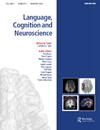Effects of unilateral anteromedial temporal lobe resections on event-related potentials when reading negative and neutral words
IF 1.8
3区 医学
Q2 AUDIOLOGY & SPEECH-LANGUAGE PATHOLOGY
引用次数: 2
Abstract
ABSTRACT We investigated effects of unilateral left (lTLR, N = 15) or right (rTLR, N = 19) anteromedial temporal lobe resections comprising amygdala and temporal pole on event-related potentials (ERPs) during attentive reading of negative and neutral words, their emotional evaluation, and recognition memory. Content effects on behaviour did not differ between lTLR, rTLR, and controls (N = 18). Negative words elicited larger ERPs than neutral words for P1, Early Posterior Negativity (EPN), and Late Positive Potential (LPP). However, the rTLR group lacked the P1 enhancement and had attenuated EPN effects. Despite showing generally the largest ERP amplitudes, the lTLR group had smaller occipital N1 and left frontal positivity for negative compared with neutral words in the N1 window. Only lTLR also had smaller left parietal P2 and larger right parietal P3 and LPP for negative words. These data help specify left and right anteromedial temporal lobe contributions to the processing of negative and neutral words.单侧前内侧颞叶切除对阅读阴性和中性词时事件相关电位的影响
本文章由计算机程序翻译,如有差异,请以英文原文为准。
求助全文
约1分钟内获得全文
求助全文
来源期刊

Language Cognition and Neuroscience
AUDIOLOGY & SPEECH-LANGUAGE PATHOLOGY-BEHAVIORAL SCIENCES
CiteScore
4.50
自引率
13.00%
发文量
70
期刊介绍:
Language, Cognition and Neuroscience (formerly titled Language and Cognitive Processes) publishes high-quality papers taking an interdisciplinary approach to the study of brain and language, and promotes studies that integrate cognitive theoretical accounts of language and its neural bases. We publish both high quality, theoretically-motivated cognitive behavioural studies of language function, and papers which integrate cognitive theoretical accounts of language with its neurobiological foundations.
The study of language function from a cognitive neuroscience perspective has attracted intensive research interest over the last 20 years, and the development of neuroscience methodologies has significantly broadened the empirical scope of all language research. Both hemodynamic imaging and electrophysiological approaches provide new perspectives on the representation and processing of language, and place important constraints on the development of theoretical accounts of language function and its neurobiological context.
 求助内容:
求助内容: 应助结果提醒方式:
应助结果提醒方式:


